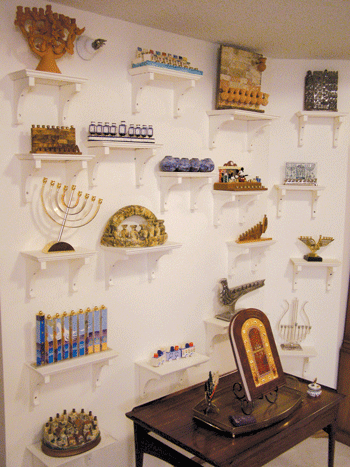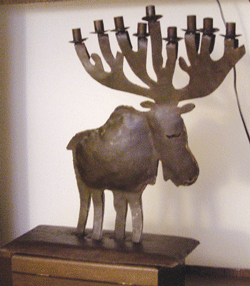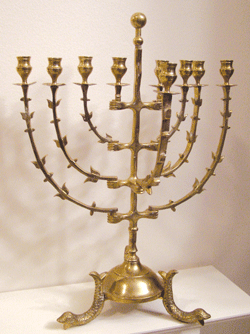Marlene Solomon, of Golden Valley, enjoys a collection of more than 60 Hanuka menoras that she’s gathered over nearly 50 years
By ERIN ELLIOTT BRYAN /Â Community News Editor
Marlene Solomon once had just one menora.
“Everybody’s grandmother had one with the two lions,” Solomon told the AJW. “I had one like that.”
But when she ended her time as a youth group leader, her students gave her a gift: a simple menora with a row of marching Maccabees.
“That was the beginning of the collection,” Solomon said. “I keep hoping, from that moment on, that no one gives me the hubcap to a Rolls-[Royce].”
Forty-nine years later, Solomon’s collection has grown to more than 60 hanukiot, Hanuka menoras, which she displays throughout her Golden Valley apartment all year long.
“When I came to rent this apartment, I immediately saw where the menoras would go,” she said. “What good is having a collection if you can’t enjoy it?”
 Marlene Solomon owns more than 60 menoras, all of which are displayed year-round throughout her apartment. (Photos: Erin Elliott Bryan)
Marlene Solomon owns more than 60 menoras, all of which are displayed year-round throughout her apartment. (Photos: Erin Elliott Bryan)
Solomon was born in Scranton, Penn., and lived most of her life in Washington, D.C., where her late husband worked for the Government Accountability Office. She moved to Minnesota 15 years ago to work as a program director at the Sabes JCC, where she met Jennifer Herman Spiller.
“According to our family, it wouldn’t be Hanuka if we didn’t celebrate with Marlene,” Herman Spiller told the AJW.
Together with her partner, Richard Hoffman, Solomon used to host a dinner party for 10-12 people during each of the eight nights of Hanuka. In recent years, the celebration has changed to a New Year’s Day brunch for nearly 90 people.
“We can’t light all the menoras together or the fire marshal will be involved,” Solomon said. “But we let some people pick out their favorite menora to light. I try to light them all at least once during Hanuka.”
 Solomon’s “Minnesota menora” — a moose.
Solomon’s “Minnesota menora” — a moose.
Many of Solomon’s menoras were gifts from her three daughters, Diana Herzan, of Medina, Minn.; Wendy Spertus, of Chicago; and Sue Turner, of Annapolis, Md. She even has a small menora shaped like a dachshund that was a gift from her “granddog,” Dappy.
“I can’t imagine my daughters will want my entire collection,” Solomon said. “I think some unsuspecting synagogue will get a big donation after I’m gone.”
Solomon already donated a 70-pound brass menora, which she purchased from a Minnesota Byerly’s gift shop, to her daughter’s synagogue in Chicago.
The collection also includes a menora her father purchased from an antique shop in Lisbon, Portugal. Solomon had the menora authenticated by the Smithsonian, and it was determined to be from the 1500s. The menora, however, includes Christian symbols, such as three fish, and the base is in the shape of a cross when the arms are removed.
“If it could talk,” Solomon said, “it would tell an amazing story.”
 Solomon’s father found this menora, which was authenticated by the Smithsonian to be from the 1500s, in an antique store in Lisbon, Portugal. It features Christian symbols, such as the three fish, and the base is in the shape of a cross when the arms are removed.
Solomon’s father found this menora, which was authenticated by the Smithsonian to be from the 1500s, in an antique store in Lisbon, Portugal. It features Christian symbols, such as the three fish, and the base is in the shape of a cross when the arms are removed.
Other unique menoras include a large one made of papier-mâché, which Solomon purchased from a theater prop shop; a small two-piece menora that depicts the reunification of Jerusalem in 1967; one that features the names of different concentration camps; a copy of an Ethiopian menora that can be used for both Hanuka and Shabbat; and a copy of the congregational menora from Temple Sinai in Washington, where she served as the director of education.
She even felt obligated to purchase an electric menora.
“I got the least intrusive one I could find,” she said.
Solomon said she doesn’t have a favorite menora — there is a story or emotion attached to each one. At this point, she no longer seeks out menoras, but will purchase one if it is unusual.
“I have a few more shelves left and that’s about it,” she said.









 Marlene Solomon owns more than 60 menoras, all of which are displayed year-round throughout her apartment. (Photos: Erin Elliott Bryan)
Marlene Solomon owns more than 60 menoras, all of which are displayed year-round throughout her apartment. (Photos: Erin Elliott Bryan) Solomon’s “Minnesota menora” — a moose.
Solomon’s “Minnesota menora” — a moose. Solomon’s father found this menora, which was authenticated by the Smithsonian to be from the 1500s, in an antique store in Lisbon, Portugal. It features Christian symbols, such as the three fish, and the base is in the shape of a cross when the arms are removed.
Solomon’s father found this menora, which was authenticated by the Smithsonian to be from the 1500s, in an antique store in Lisbon, Portugal. It features Christian symbols, such as the three fish, and the base is in the shape of a cross when the arms are removed.









